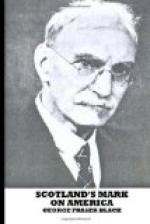SCOTS IN LITERATURE
John Lawson (c. 1658-1711), Surveyor-General of North Carolina, a native of Aberdeen, published “A New Voyage to Carolina,” in 1709, reprinted 1714, 1718, 1737, 1860, and twice translated into German (1712, 1722). Lawson was cruelly murdered by the Tuscaroras. Hugh Henry Brackenridge (1748-1816), born near Campbeltown, Argyllshire, Judge of the Supreme Court of Pennsylvania, was author of a political satire, “Modern Chivalry,” a work now extremely rare. David Ramsay (1749-1815), physician and patriot, of Ulster Scot descent, Delegate to the Continental Congress, was author of historical works relating to the Revolution and to South Carolina. Gilbert Imlay, born about 1755 in New Jersey of Scottish parents, was the first Kentucky novelist, author of “The History of an Expatriated Family” (1793), etc. Robert Dinsmoor (1757-1836), poet, was brother of Governor Dinsmoor of New Hampshire. Hugh McCall (1767-1824), author of the first “History of Georgia,” (published in 2 v., 1811-16), was of Scottish descent. His ancestor emigrated from Dumbartonshire to Ulster along with the ancestor of J.C. Calhoun. The ancestors of both remained two generations in Ulster before coming to America. The greatest name in American literature is that of the son of the Orcadian farmer, Washington Irving (1783-1859). He was the first who won international honors for American literature. John Mellish or Melish (1771-1822), born in Perthshire, died in Philadelphia, traveled extensively in the United States and published several volumes of his travels and also published many topographical and military maps. James Murdock (1776-1856), of Ulster Scot descent, translated and edited Mosheim’s “Institutes of Ecclesiastical History,” Milman’s “History of Christianity,” etc. Henry Marie Brackenridge (1786-1871), author and jurist, was son of the author of “Modern Chivalry.” Thomas F. Gordon (1789-1860), lawyer and historian of New Jersey, Pennsylvania, etc., was of Scottish ancestry. Augustus Baldwin Longstreet (1790-1870), lawyer, newspaper editor, author of “Georgia Scenes” (1840), etc., was son of the inventor. Lydia (Huntley) Sigourney (1791-1865), poet and miscellaneous writer, was partly of Scots descent. Hew Ainslie (1792-1878), author of a “Pilgrimage to the Land of Burns,” etc., was born in Ayrshire. David Paul Brown (1795-1872), born in Philadelphia of Scottish parents, was author of “The Forum; or Forty Years of Practice at the Philadelphia Bar.” James Lawson (1799-1880), newspaper editor and dramatist, was born in Glasgow and died in Yonkers. Angus Umphraville of Missouri, the unknown author of “Missourian Lays” (St. Louis, 1821), was most probably a Scot. His verses are described as “simply wonderful.” Maria J. McIntosh (1803-78), authoress, was descended from the McIntoshes of Georgia. George Washington Bethune (1805-62) of New York, a




